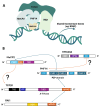Epigenetic Regulation and Neurodevelopmental Disorders: From MeCP2 to the TCF20/PHF14 Complex
- PMID: 39766920
- PMCID: PMC11728296
- DOI: 10.3390/genes15121653
Epigenetic Regulation and Neurodevelopmental Disorders: From MeCP2 to the TCF20/PHF14 Complex
Abstract
Background: Neurodevelopmental disorders (NDDs) affect approximately 15% of children and adolescents worldwide. This group of disorders is often polygenic with varying risk factors, with many associated genes converging on shared molecular pathways, including chromatin regulation and transcriptional control. Understanding how NDD-associated chromatin regulators and protein complexes orchestrate these regulatory pathways is crucial for elucidating NDD pathogenesis and developing targeted therapeutic strategies. Recently, the TCF20/PHF14 chromatin complex was identified in the mammalian brain, expanding the list of chromatin regulatory remodelers implicated in NDDs. This complex-which includes MeCP2, RAI1, TCF20, PHF14, and HMG20A-plays a vital role in epigenetic and transcriptional regulation.
Methods: We review and summarize current research and clinical reports pertaining to the different components of the MeCP2-interacting TCF20/PHF14 complex. We examine the NDDs associated with the TCF20/PHF14 complex, explore the molecular and neuronal functions of its components, and discuss emerging therapeutic strategies targeting this complex to mitigate symptoms, with broader applicability to other NDDs.
Results: Mutations in the genes encoding the components of the MeCP2-interacting TCF20/PHF14 complex have been linked to various NDDs, underscoring its critical contribution to brain development and NDD pathogenesis.
Conclusions: The MeCP2-interacting TCF20/PHF14 complex and its associated NDDs could serve as a model system to provide insight into the interplay between epigenetic regulation and NDD pathogenesis.
Keywords: HMG20A; MeCP2; PHF14; RAI1; Rett syndrome; TCF20; chromatin regulators; neurodevelopmental disorders; neuronal activity; transcription.
Conflict of interest statement
The authors declare no conflicts of interest.
Figures

Similar articles
-
Disruption of MeCP2-TCF20 complex underlies distinct neurodevelopmental disorders.Proc Natl Acad Sci U S A. 2022 Jan 25;119(4):e2119078119. doi: 10.1073/pnas.2119078119. Proc Natl Acad Sci U S A. 2022. PMID: 35074918 Free PMC article.
-
Rare and de novo duplications containing TCF20 are associated with a neurodevelopmental disorder.Clin Genet. 2022 Mar;101(3):364-370. doi: 10.1111/cge.14099. Epub 2021 Dec 28. Clin Genet. 2022. PMID: 34904221
-
Rett syndrome: disruption of epigenetic control of postnatal neurological functions.Hum Mol Genet. 2015 Oct 15;24(R1):R10-6. doi: 10.1093/hmg/ddv217. Epub 2015 Jun 9. Hum Mol Genet. 2015. PMID: 26060191 Free PMC article. Review.
-
Novel alterations in the epigenetic signature of MeCP2-targeted promoters in lymphocytes of Rett syndrome patients.Epigenetics. 2013 Mar;8(3):246-51. doi: 10.4161/epi.23752. Epub 2013 Jan 24. Epigenetics. 2013. PMID: 23348913 Free PMC article.
-
Epigenetic regulation of autophagy-related genes: Implications for neurodevelopmental disorders.Autophagy. 2024 Jan;20(1):15-28. doi: 10.1080/15548627.2023.2250217. Epub 2023 Sep 6. Autophagy. 2024. PMID: 37674294 Free PMC article. Review.
Cited by
-
Exploring the complexity of MECP2 function in Rett syndrome.Nat Rev Neurosci. 2025 Jul;26(7):379-398. doi: 10.1038/s41583-025-00926-1. Epub 2025 May 13. Nat Rev Neurosci. 2025. PMID: 40360671 Review.
References
-
- Gidziela A., Ahmadzadeh Y.I., Michelini G., Allegrini A.G., Agnew-Blais J., Lau L.Y., Duret M., Procopio F., Daly E., Ronald A., et al. A meta-analysis of genetic effects associated with neurodevelopmental disorders and co-occurring conditions. Nat. Hum. Behav. 2023;7:642–656. doi: 10.1038/s41562-023-01530-y. - DOI - PMC - PubMed
-
- Moffitt T.E., Houts R., Asherson P., Belsky D.W., Corcoran D.L., Hammerle M., Harrington H., Hogan S., Meier M.H., Polanczyk G.V., et al. Is Adult ADHD a Childhood-Onset Neurodevelopmental Disorder? Evidence from a Four-Decade Longitudinal Cohort Study. Am. J. Psychiatry. 2015;172:967–977. doi: 10.1176/appi.ajp.2015.14101266. - DOI - PMC - PubMed
-
- Liah M., Andrew L., Mark M., Tim F., Eavan M., Lisa C. Adult onset neurodevelopmental disorder with regression, abnormal movement, loss of speech and seizures (NEDAMSS); Proceedings of the Association of British Neurologists: Annual Meeting Abstracts; Belfast, UK. 20 May 2023; p. A79.
Publication types
MeSH terms
Substances
Grants and funding
LinkOut - more resources
Full Text Sources
Miscellaneous

